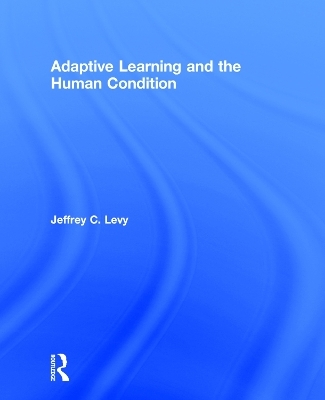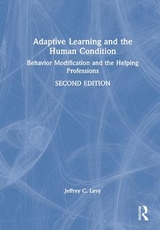
Adaptive Learning and the Human Condition
Routledge (Verlag)
978-0-205-20547-9 (ISBN)
- Titel erscheint in neuer Auflage
- Artikel merken
Adaptive Learning and the Human Condition emphasizes the relationship between experimental research and classical and instrumental conditioning. The text addresses classical and instrumental conditioning while stressing the definition of learning as an adaptive process through which individuals acquire the ability to predict and control the environment. This approach creates a perspective within which it is possible to consider the fundamental nature of the learning process in understanding the human condition and in addressing significant individual and social concerns.
Learning Goals
Upon completing this book, readers should be able to:
Explain the significance of human condition through adaptive learning
Present the basic principles of classical and instrumental conditioning
Understand the significance of scientific research
Note: MySearchLab does not come automatically packaged with this text. To purchase MySearchLab, please visit: www.mysearchlab.com or you can purchase a ValuePack of the text +MySearchLab: ValuePack ISBN-10: 0205950779 / ValuePack ISBN-13: 9780205950775
Jeffrey C. Levy’s professional career at Seton Hall University may be divided into three stages, BC, DC, and AC (before, during, and after his 24-year term as chair of the Department of Psychology). Frequently recognized for teaching excellence, he received the Deans Advisory Council’s Outstanding Teacher Award for the College of Arts & Sciences, Sears-Roebuck Award for College Teaching and Campus Leadership, and was twice nominated by Seton Hall for National CASE Professor of the Year recognition. Trained as an experimental psychologist with interests in behavior modification, Levy regularly taught the undergraduate Learning course with and without a related animal laboratory and a graduate course in Behavior Modification. A sabbatical opportunity subsequent to his service as chair enabled him to dedicate a year to elaborating upon this teaching experience and drafting Adaptive Learning and the Human Condition.
In this Section:
1) Brief Table of Contents
2) Full Table of Contents
BRIEF TABLE OF CONTENTS:
Part 1: A Science of Adaptive Learning
Chapter 1: Science, Psychology, and Adaptive Learning
Chapter 2: Adaptive Learning Research Methods
Part 2: Predictive Learning
Chapter 3: Predictive Learning: Basic Principles and Phenomena
Chapter 4: Predictive Learning: Basic Variables and Theoretical Issues
Chapter 5: Predictive Learning: Applications
Part 3: Control Learning
Chapter 6: Control Learning: Basic Principles and Phenomena
Chapter 7: Control Learning: Basic Variables and Theoretical Issues
Chapter 8: Control Learning: Applications
Chapter 9: Schedules of Reward and Maintenance of Learned Behavior
Part 4: The Human Condition
Chapter 10: Personality, Socialization, and Culture
Chapter 11: Becoming Human and Transforming the Human Condition
Chapter 12: Becoming Human through Indirect Social Learning
Chapter 13: Individual and Cultural Self-Actualization
Chapter 14: Self-Actualization through Self-Control
FULL TABLE OF CONTENTS:
Part 1: A Science of Adaptive Learning
Chapter 1. Science, Psychology, and Adaptive Learning
The Human Condition Explanation and Empiricism
The Scientific Method
Early History of Psychology
Psychology Today
Scientific Explanation in Psychology
Where Does Psychology Look for Explanations?
Definitions of Learning
Direct and Indirect Learning
Summary
Key Terms
Chapter 2. Adaptive Learning Research Methods
Internal and External Validity
Non-Experimental Research Methods
Experimental Research Methods
Adaptive Learning Research Methods and External Validity
Summary
Key Terms
Part 2. Predictive Learning
Chapter 3. Predictive Learning: Basic Principles and Phenomena
Pavlov’s classical conditioning paradigm
Measurement Procedures
Basic predictive learning phenomena
Predictive learning schema with excitatory and inhibitory stimuli
Summary
Key Terms
Chapter 4. Predictive Learning: Basic Variables and Theoretical Issues
Variables influencing predictive learning
Theoretical Issues
Summary
Key Terms
Chapter 5. Predictive Learning: Applications
Basic and applied science
Direct classical conditioning of emotions
Indirect classical conditioning of emotions
Desensitization and sensitization procedures
Classical conditioning of word meaning
Classical conditioning of attitudes
Classical conditioning of drug tolerance
Summary
Key Terms
Part 3. Control Learning
Chapter 6. Control Learning: Basic Principles and Phenomena
Thorndike and Skinner
Apparatuses used to study control learning
Skinner’s contingency schema
Adaptive learning overview of predictive and control learning
Learned and unlearned appetitive and aversive stimuli
Discriminative stimuli and warning stimuli
Stimulus-response chains
Basic control learning phenomena
Species specific characteristics and control learning
Other basic control learning phenomena
Summary
Key Terms
Chapter 7. Control Learning: Basic Variables and Theoretical Issues
Variables influencing control learning
Theoretical issues
Summary
Key Terms
Chapter 8: Control Learning: Applications
Speech and Language (verbal symbolic behavior)
Parenting
Treating behavioral problems with non-verbal individuals
Treating behavioral problems with verbal individuals
Empirically validated therapeutic techniques
Using technology to facilitate control learning
Relapse prevention
Summary
Key Terms
Chapter 9. Schedules of Reward and Maintenance of Learned Behavior
Skinnerian methodology
Skinner’s schema of intermittent schedules of reinforcement
Why do ratio schedules produce higher response rates than interval schedules?
Maintenance of learned behavior
Differential reinforcement schedules as alternatives to punishment
Extinction as an alternative to punishment
Non-contingent reinforcement as an alternative to punishment
Summary
Key Terms
Part 4. The Human Condition
Chapter 10. Personality, Socialization, and Culture
Multiple schedules, personality, and culture
Stimulus control, baseball, and the human condition
Measuring stimulus control in the laboratory
Determinants of stimulus control test patterns
The peak shift and Spence’s model of discrimination learning
Attention theory and discrimination learning
Summary
Key Terms
Chapter 11. Becoming Human and Transforming the Human Condition
Concept learning
Learning to learn
Basic research in problem-solving
The general problem-solving process
Tools, technology, and the human condition
The phonetic alphabet and Arabic numbering system
Summary
Key Terms
Chapter 12. Becoming Human through Indirect Social Learning
Observational learning
Speech and language
Preparing for school and the 3 Rs
Summary
Key Terms
Chapter 13. Individual and Cultural Self-Actualization
The Nukak’s physiological needs
The Nukak’s shelter and safety needs
The Nukak’s love and interpersonal needs
The Nukak’s esteem needs
The Nukak’s self-actualization needs
Our physiological needs
Our shelter and safety needs
Our love and interpersonal needs
Developmental tasks and stages for the Nukak and us
Our esteem needs
Our self-actualization needs
Bridges, globalization, and the human condition
Summary
Key Terms
Chapter 14. Self-Actualization through Self-Control
Concurrent schedules and the matching law
Self-control – magnitude and delay of reinforcement
Matching, impulsiveness, and adaptive learning
Determinism and Freedom
Lightning, sharks, and human predators
Will Power and Self-Control
Self-Control as Problem Solving
Improving the human condition through humanistic ecology
Summary
Key Terms
| Erscheint lt. Verlag | 15.1.2013 |
|---|---|
| Verlagsort | New York |
| Sprache | englisch |
| Maße | 187 x 232 mm |
| Gewicht | 635 g |
| Themenwelt | Schulbuch / Wörterbuch |
| Geisteswissenschaften ► Psychologie ► Allgemeine Psychologie | |
| Geisteswissenschaften ► Psychologie ► Pädagogische Psychologie | |
| ISBN-10 | 0-205-20547-X / 020520547X |
| ISBN-13 | 978-0-205-20547-9 / 9780205205479 |
| Zustand | Neuware |
| Informationen gemäß Produktsicherheitsverordnung (GPSR) | |
| Haben Sie eine Frage zum Produkt? |
aus dem Bereich



